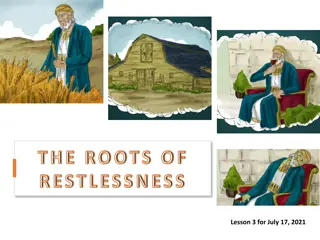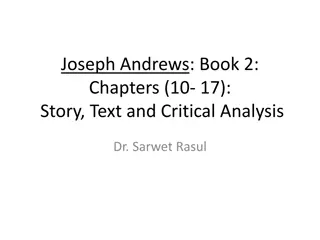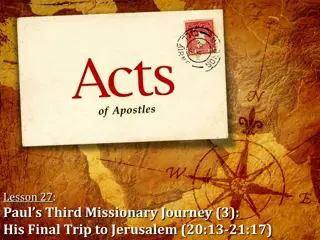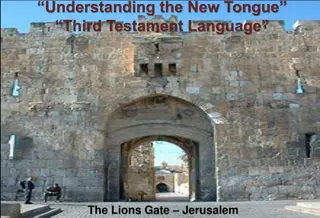Love vs. Selfishness: Lessons Learned from Jerusalem's Destruction
The destruction of Jerusalem in 70 AD serves as a poignant reminder of the consequences of rejecting God's love and succumbing to selfishness. Through historical accounts and biblical references, we uncover the tragic events leading to Jerusalem's downfall, emphasizing the importance of fidelity, compassion, and the enduring care of God for His people. Reflect on the choices between love and selfishness showcased in the ancient conflict between faith and destruction.
Download Presentation

Please find below an Image/Link to download the presentation.
The content on the website is provided AS IS for your information and personal use only. It may not be sold, licensed, or shared on other websites without obtaining consent from the author.If you encounter any issues during the download, it is possible that the publisher has removed the file from their server.
You are allowed to download the files provided on this website for personal or commercial use, subject to the condition that they are used lawfully. All files are the property of their respective owners.
The content on the website is provided AS IS for your information and personal use only. It may not be sold, licensed, or shared on other websites without obtaining consent from the author.
E N D
Presentation Transcript
THE CENTRAL ISSUE: LOVE OR SELFISHNESS? Lesson 2 for April 13, 2024
The year 70 marked the end of Israel as a nation. Although it was Rome that devastated Jerusalem and the Temple, other powers were involved in that war. On the one hand, Satan incited Israel to reject the Messiah, and then claim his right to destroy the nation. On the other hand, God warned repeatedly of the consequences of rejecting him; delayed the execution of the sentence; and prepared a people, the Church, to pick up the torch of truth and illuminate the world with the message of God's love. Lessons from the destruction of Jerusalem: The rejection of the love of God. God's care for his people. Lessons from the first Christians: Fidelity in the pursuit. Help the needy. Love, our sign of identity.
LESSONS FROM THE DESTRUCTION OF JERUSALEM
THE REJECTION OF THE LOVE OF GOD Jerusalem, Jerusalem, you who kill the prophets and stone those sent to you, how often I have longed to gather your children together, as a hen gathers her chicks under her wings, and you were not willing! (Matthew 23:37) Jesus wept as he approached Jerusalem (Luke 19:41-44). He knew that they would suffer the well-deserved consequences of their stubborn rejection of God's loving calls (Matt. 23:37). He cried because the tragedy could have been avoided. Because God loves us so much that he does not want anyone to die, but for everyone to have eternal life (Jn. 5:39-40; Ezek. 18:31-32). History tells us that the Jews rebelled in the year 66 against Roman abuses. The various Jewish factions fought among themselves, while the Romans laid siege to the city. In the year 70 everything ended. Titus destroyed Jerusalem and the Temple. One million Jews perished. But history does not tell us how Satan incited the Jews to rebellion, and the Romans to revenge. The destruction of Jerusalem was the direct work of the devil. By turning away from the source of life, Israel was at the mercy of an enemy that only seeks destruction and death.
GOD'S CARE FOR HIS PEOPLE So do not fear, for I am with you; do not be dismayed, for I am your God. I will strengthen you and help you; I will uphold you with my righteous right hand (Isaiah 41:10) In his love, God gave an opportunity to everyone who wanted to escape destruction. He gave a sign: Jerusalem surrounded by armies (Luke 21:20). Gaius Cestius Gallus fulfilled that sign in the year 66. The siege was lifted, and the Zealot leader Eleazar ben Simon pursued the Romans and defeated them. Everyone who believed in Jesus' words took advantage of that moment when Jerusalem was left unguarded to flee. A few months later, Nero sent Vespasian to quell the rebellion. From the year 67 to 70, the siege was permanent. God can and wants to protect his children, even in the most difficult times (Ps. 46:1; Is. 41:10). However, many have lost their lives because of their faithfulness to God (Heb. 11:35-38). Why are some protected and others, apparently, abandoned by God?
The mysterious providence which permits the righteous to suffer persecution at the hand of the wicked has been a cause of great perplexity to many who are weak in faith. Some are even ready to cast away their confidence in God because He suffers the basest of men to prosper, while the best and purest are afflicted and tormented by their cruel power. How, it is asked, can One who is just and merciful, and who is also infinite in power, tolerate such injustice and oppression? This is a question with which we have nothing to do. God has given us sufficient evidence of His love, and we are not to doubt His goodness because we cannot understand the workings of His providence. EGW (The Great Controversy, pg. 47)
LESSONS FROM THE EARLY CHRISTIANS
FAITHFULNESS IN THE PERSECUTION But Saul began to destroy the church. Going from house to house, he dragged off both men and women and put them in prison (Acts 8:3) The beginnings were truly hopeful: conversions numbered in the thousands (Acts 2:41; 4:4); the believers preached with power (Acts 4:31; 5:42). But the enemy was restless. First threats (Acts 4:17-18); then, punishments (Acts 5:40); finally, death (Acts 7:59). Because of the persecution raised by Saul, the disciples were scattered (Acts 8:1). But, far from the light going out, thanks to the faithfulness of the believers, it shone with much more brilliance throughout the entire known world (Acts 8:4; 11:19-21; Rom. 15:19; Col. 1:23). Jesus had given his Church a commission and the power to carry it forward (Acts 1:8). No power, physical or spiritual, can stop the advance of the gospel (Matt. 16:18). If God is for us, no one can be against us! (Rom. 8:31)
HELP THOSE IN NEED And they sold their property and their goods, and distributed it to all according to each one's need (Acts 2:45) What effect did the gospel have on the early Christians (Acts 2:42-47)? They believed in the doctrine of Jesus Those who had the gift healed the sick. They had all things in common They shared what they had with those in need. They had public meetings They had meetings in homes, where they celebrated the Lord s Supper They lived with joy and simplicity of heart They praised God As ambassadors of Christ, they imitated Jesus. By caring for the needs of those around them, they gained the favor of the entire town. As then, the Church must be characterized by the love of Christians for each other, and by concern for their community.
By this everyone will know that you are my disciples, if you have love for one another (John 13:35) Each of the parties involved in the cosmic conflict has its own characteristics: Satan hates and destroys; God loves and restores. Followers of one party or another act according to these patterns. If we follow God, we will show it through the love shown to others (1Jn. 4:20-21). Christians of the 2nd and 3rd centuries put selfless love into practice. During two major pandemics (in the years 160 and 265), they dedicated themselves to caring for those affected, without taking into account their own safety. They gave themselves out of love, and they benefited millions of people. But they did not draw their attention to themselves, but to the one for whom they were willing to give their lives, their Savior: Jesus.
It is the privilege of every soul to be a living channel through which God can communicate to the world the treasures of His grace, the unsearchable riches of Christ. There is nothing that Christ desires so much as agents who will represent to the world His Spirit and character. There is nothing that the world needs so much as the manifestation through humanity of the Saviour's love. All heaven is waiting for channels through which can be poured the holy oil to be a joy and blessing to human hearts. EGW (God's Amazing Grace - Unsearchable Riches, June 28)























